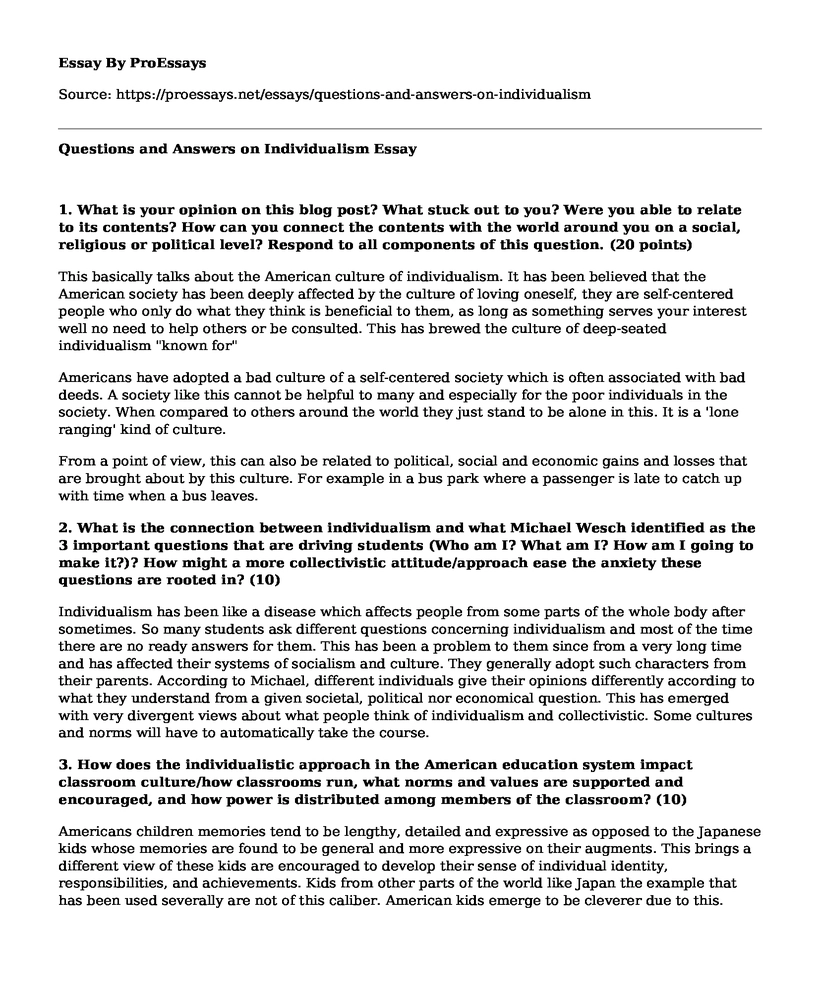1. What is your opinion on this blog post? What stuck out to you? Were you able to relate to its contents? How can you connect the contents with the world around you on a social, religious or political level? Respond to all components of this question. (20 points)
This basically talks about the American culture of individualism. It has been believed that the American society has been deeply affected by the culture of loving oneself, they are self-centered people who only do what they think is beneficial to them, as long as something serves your interest well no need to help others or be consulted. This has brewed the culture of deep-seated individualism "known for"
Americans have adopted a bad culture of a self-centered society which is often associated with bad deeds. A society like this cannot be helpful to many and especially for the poor individuals in the society. When compared to others around the world they just stand to be alone in this. It is a 'lone ranging' kind of culture.
From a point of view, this can also be related to political, social and economic gains and losses that are brought about by this culture. For example in a bus park where a passenger is late to catch up with time when a bus leaves.
2. What is the connection between individualism and what Michael Wesch identified as the 3 important questions that are driving students (Who am I? What am I? How am I going to make it?)? How might a more collectivistic attitude/approach ease the anxiety these questions are rooted in? (10)
Individualism has been like a disease which affects people from some parts of the whole body after sometimes. So many students ask different questions concerning individualism and most of the time there are no ready answers for them. This has been a problem to them since from a very long time and has affected their systems of socialism and culture. They generally adopt such characters from their parents. According to Michael, different individuals give their opinions differently according to what they understand from a given societal, political nor economical question. This has emerged with very divergent views about what people think of individualism and collectivistic. Some cultures and norms will have to automatically take the course.
3. How does the individualistic approach in the American education system impact classroom culture/how classrooms run, what norms and values are supported and encouraged, and how power is distributed among members of the classroom? (10)
Americans children memories tend to be lengthy, detailed and expressive as opposed to the Japanese kids whose memories are found to be general and more expressive on their augments. This brings a different view of these kids are encouraged to develop their sense of individual identity, responsibilities, and achievements. Kids from other parts of the world like Japan the example that has been used severally are not of this caliber. American kids emerge to be cleverer due to this.
4. Where do you locate yourself/your culture on the individualistic collectivistic (I-We) cultural spectrum? Explain how you determined this. (5)
My position in this spectrum assumes a collectivist approach. This is because I regard others' input as well as mine. I, therefore, believe in accomplishing a task collectively by considering the notion that group work can yield proper results.
5. How does your position on this spectrum influence your behavior or your definition of what it means to participate in the college classroom? (5)
My position in the spectrum has facilitated my ability to join the other class members and the instructor in discussions. I am always keen to get what others have as a contribution to a topic of discussion.
6. How does an individualistic mindset or attitude influence one's ability to actively listen to others? (5)
This state of individualistic mindset implies that one is outstanding in this as compared to collectivistic individuals. The individualistic stand alone in the whole societies as opposed to the norm of many cultures around the world today. Such individuals tend to believe in themselves in the society and therefore are not ready to listen to others. They already have a prejudgment that what will hear from others may not helpful therefore tend to avoid listening effectively.
7. Create your own question for the room based on the blog, chapter 2, Bakhtin's quote, Wesch's Ted talk, or any combination of the four. Include your question below. Be prepared to ask your question during our seminar. (5)
What is desirable about being individualistic?
Cite this page
Questions and Answers on Individualism. (2022, May 12). Retrieved from https://proessays.net/essays/questions-and-answers-on-individualism
If you are the original author of this essay and no longer wish to have it published on the ProEssays website, please click below to request its removal:
- Forage Societies and the Elderly Essay
- Punishment and Society Essay Example
- Health Disparities Among the Hispanic Community Essay
- Essay Sample on Ethnicity and Racism in Canada
- Essay Example on Honesty: Key Pillar of Relationships
- Essay Example on Nonverbal Communication: Types & Meanings
- Essay Example on Katharine Graham: A Leader Embodying Self-Awareness and Relationships







